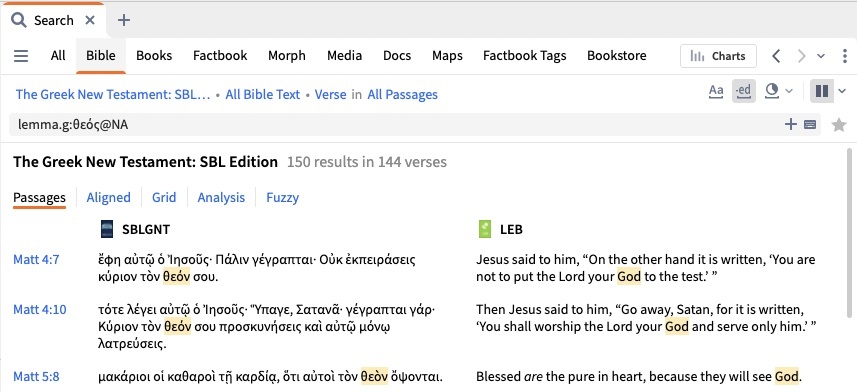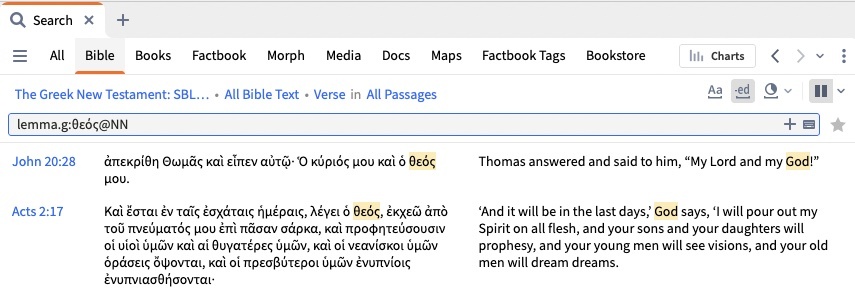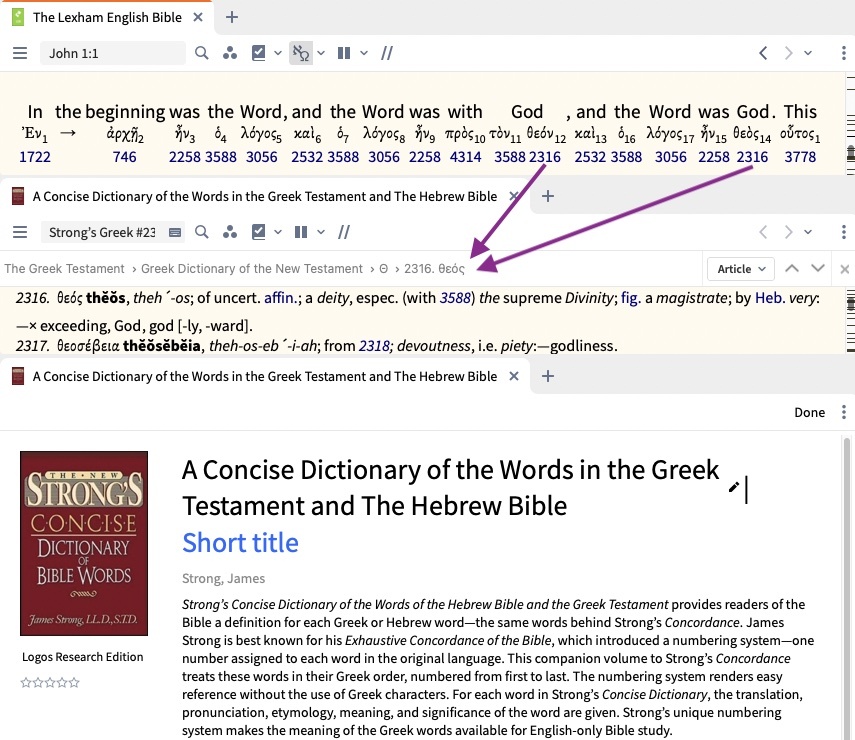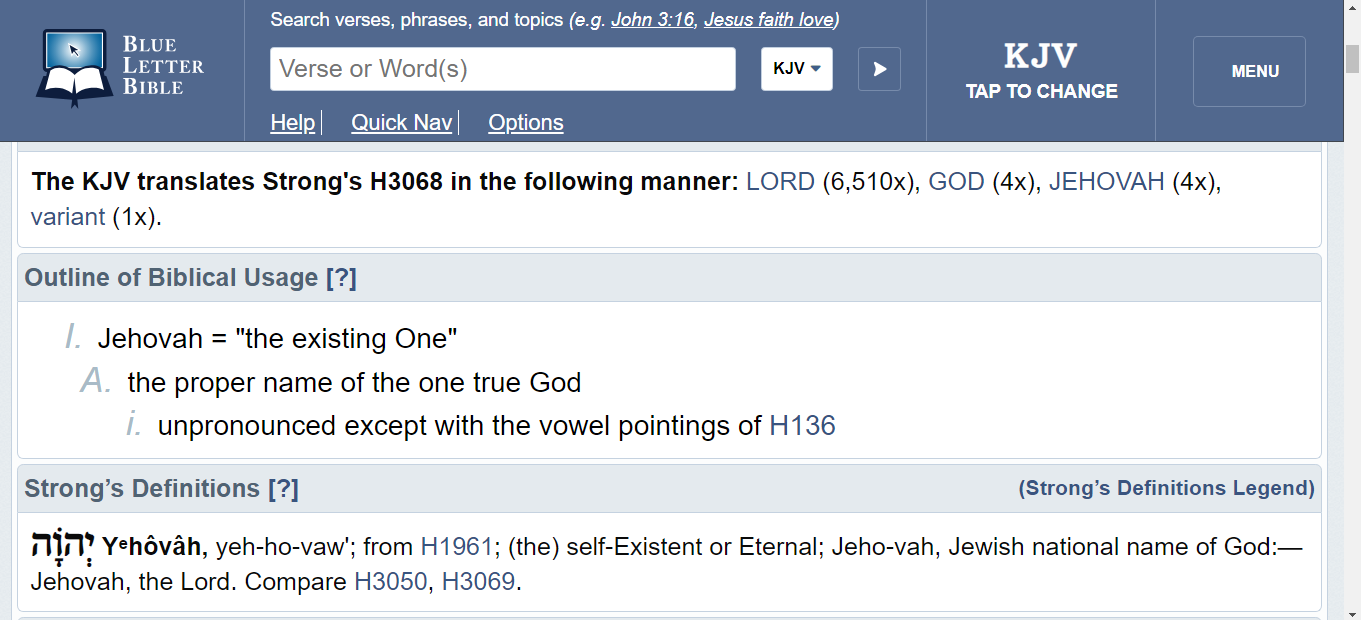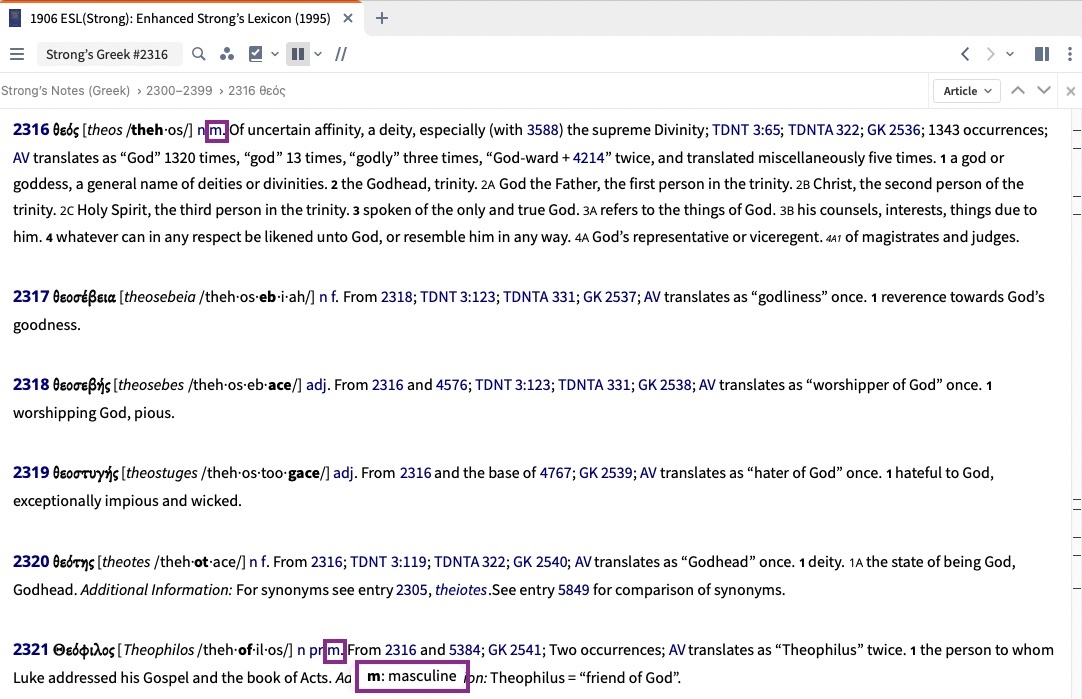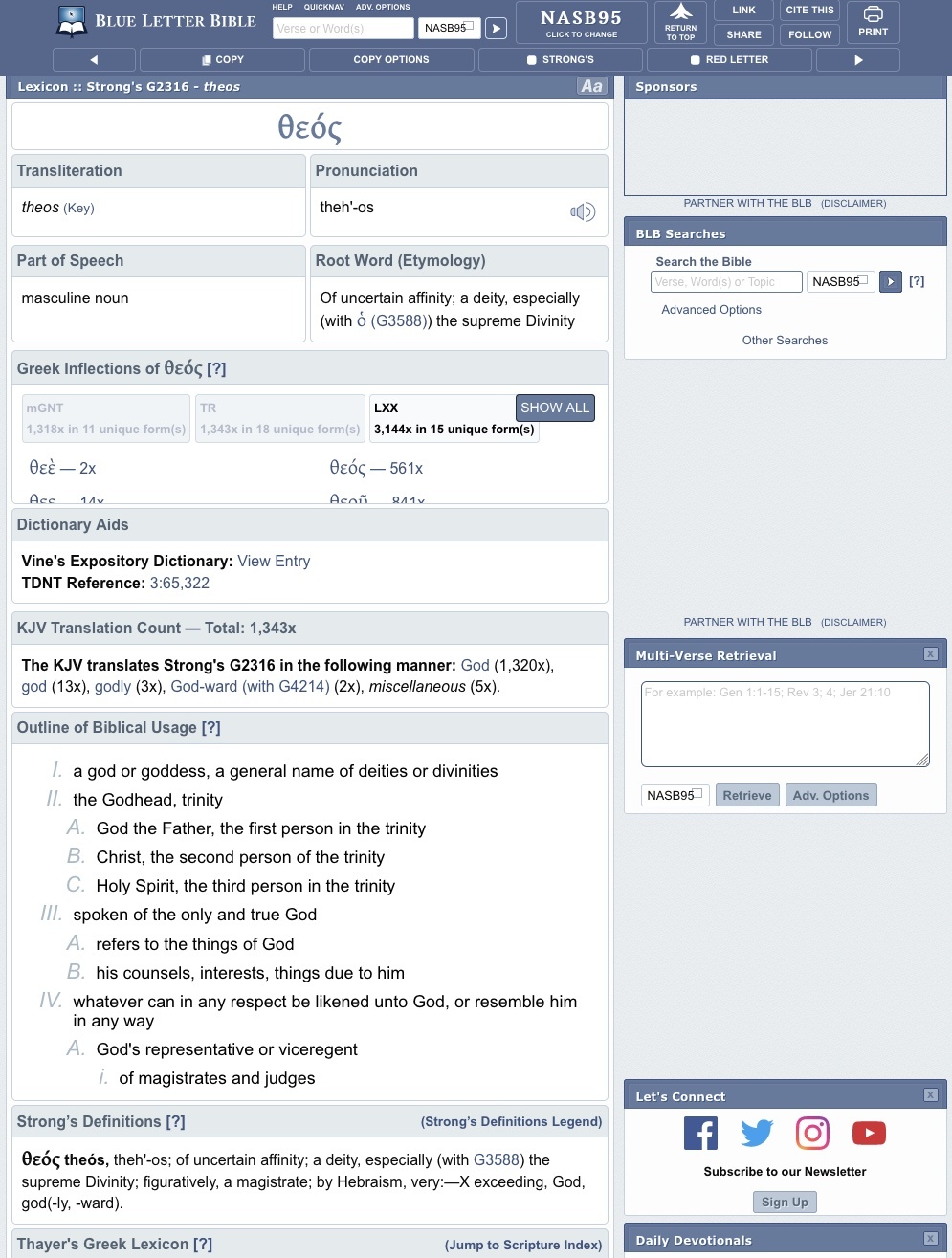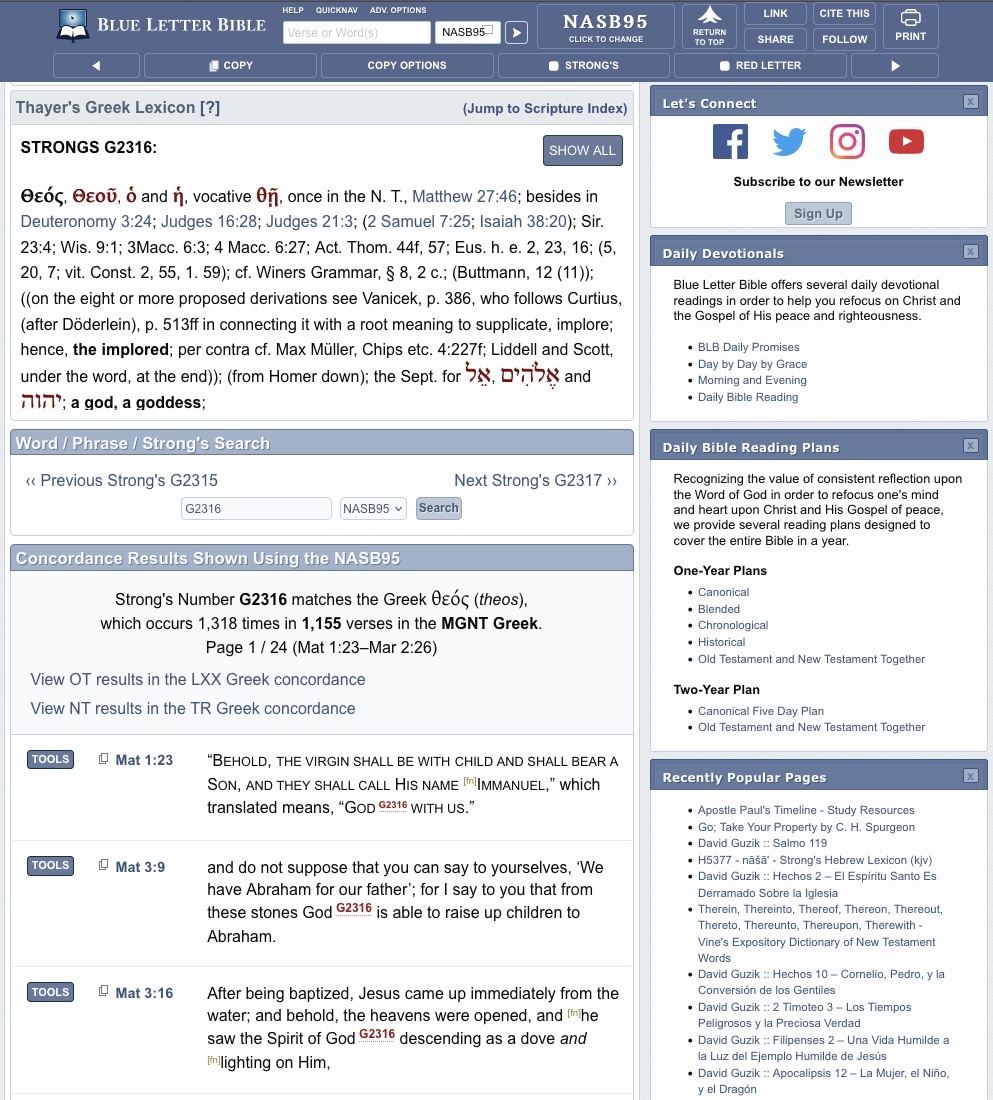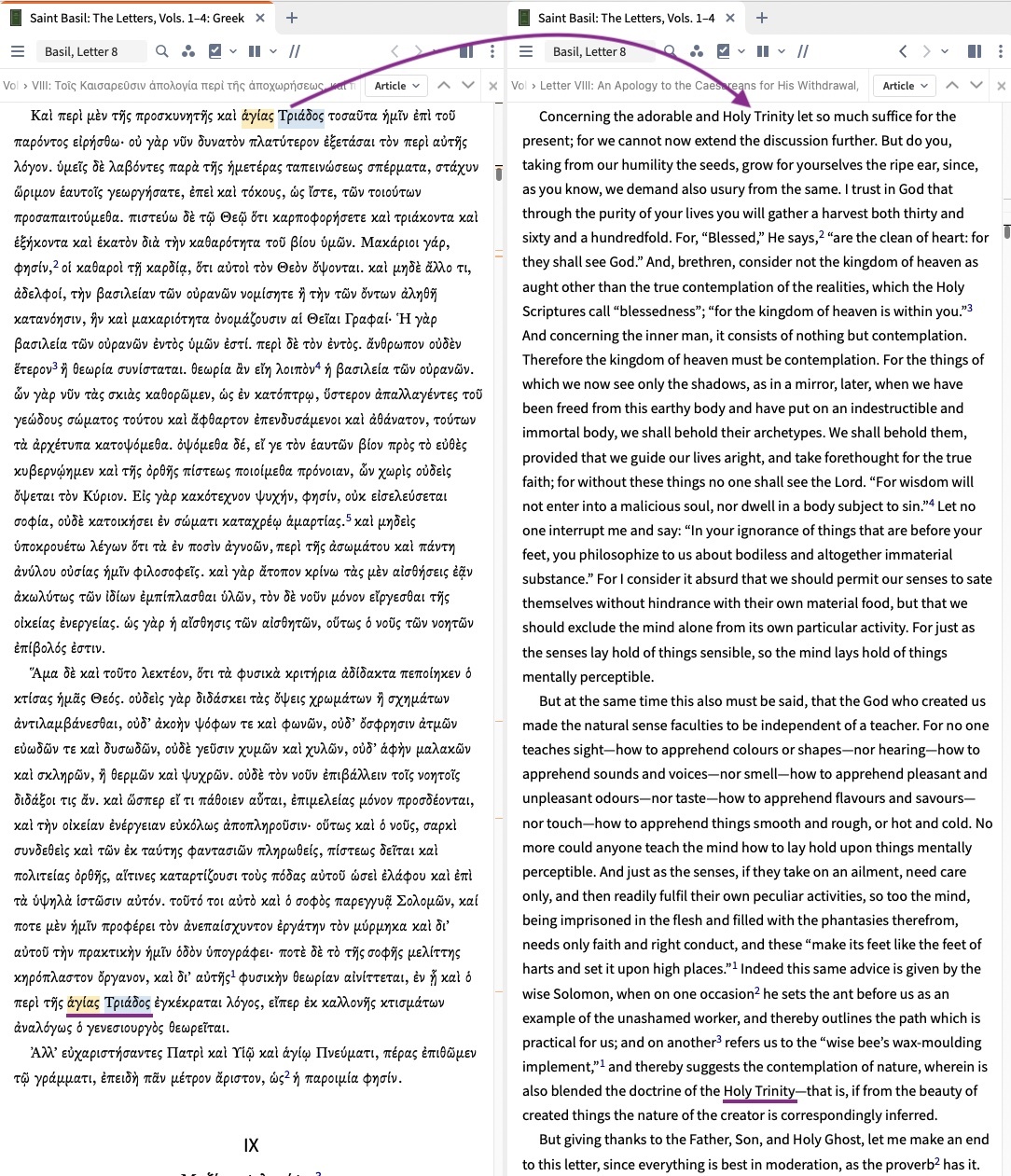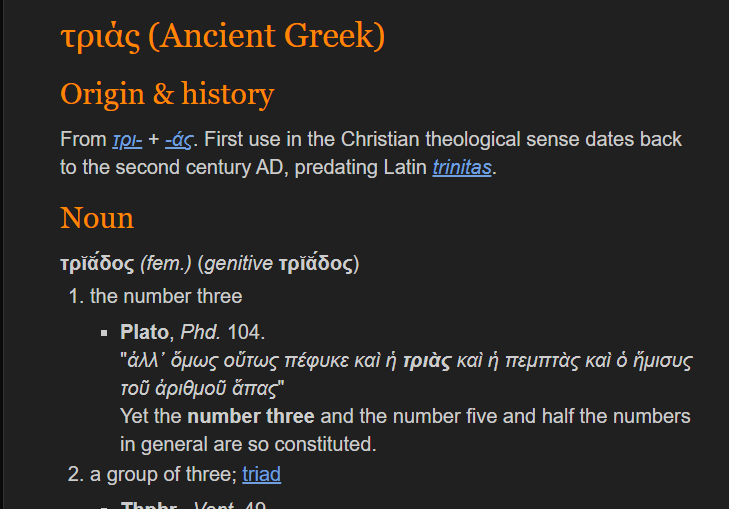God's Name Found in the Greek Scriptures under θεόν (theon).

Imagine opening the Bible, and of all sudden, like a bolt of lightning, being instantly stuck with the Manifestation of God's Holy Name in the New Testament!
The Greek language contains two Greek titles for God. The first title is θεόν (theon) and it refers to 'the God" as Supreme One or Self-Existent One. The second Greek title θεός (theos) can apply to God, a god, or gods and is shared with many. But θεόν (theon) refers to only to the True God as in (John 17:3). θεόν (theon) is a superlative title given to Jehovah alone.
According to the Gesenius' Hebrew-Chaldee Lexicon. It mentions that later Hebrews, for some centuries before the time of Christ, either Misled by False Interpretation of certain laws, or else following some old superstition. Then goes on to tell us, that every time the later Hebrews came upon the Name of God, they substituted Lord. They also pointed out that θεόν was in reference to God's Name.
So let's try to insert our newly found information and see if it holds true.
- "In the beginning was the Word, and the Word was with Jehovah, and the Word was a god."(John 1:1)
- No man has seen Jehovah at any time; the only-begotten god who is at the Father’s side is the one who has explained Him. (John 1:18)
Here are a few notable scriptures with the superlative title θεόν (theon) :
GRK: εἰς τὸν θεόν καὶ εἰς
NAS: believe in God, believe
KJV: ye believe in God, believe also
INT: on God also on
GRK: μόνον ἀληθινὸν θεὸν καὶ ὃν
NAS: true God, and Jesus
KJV: the only true God, and Jesus
INT: only true God and whom
GRK: ὑμῶν καὶ θεόν μου καὶ
NAS: and your Father, and My God and your God.'
KJV: and [to] my God, and your
INT: of you and God of me and
Inserting God's Name doesn't flow smoothly in all 148 Greek occurrences. For example, in John 17:3 inserting the meaning of the title θεόν (theon) not only fits, but gives deeper understanding.
- This means everlasting life, their coming to know you, the only true Supreme One, and the one whom you sent, Jesus Christ.
- This means everlasting life, their coming to know you, the only true Self-Existent One, and the one whom you sent, Jesus Christ.
Then again, the quote from Jesus Christ invoking the title θεόν in (John 14:1)
- Do not let your hearts be troubled. Exercise faith in Jehovah; exercise faith also in me.
Thankful for Google transliterates יהוה in English as Jehovah. Visit JW.org about whom Jesus Christ calls the Only True God in (John 17:3)
Comments
-
"But θεόν (theon) refers to only to the True God as in (John 17:3). θεόν (theon) is a superlative title given to Jehovah alone."
I don't disagree that the accusative θεόν carries the meaning of God, or god; which God, or god, is then determined from the context that θεόν is found within.
The accusative form, such as θεόν, serves the primary grammatical purpose of denoting that it is performing as an object of a preposition or as an object of a verb – not that it has some assumed theological meaning attached to it.
I do then disagree with this proposed theory presented above; where a Greek accusative, used to show what function the word is preforming in a sentence, is somehow turned into a "superlative title" for "Jehovah alone".
If this were truly the case then it would be required grammatically that the nominative form θεός be included also in this "superlative title" for "Jehovah alone" as well; since, θεόν is θεός in the accusative.
Overall, the accusative form of θεός (θεόν), just as the nominative θεός itself, or the genitive θεοῦ, even the vocative θεέ, are all grammatically, and theologically, agnostic in the Greek language as to which God, or god, it is used of.
I did set aside the time to look at each individual instance of θεόν in the NT, and the following is a breakdown from that look.
Prepositional object:
Mt. 27:43; Lk. 1:16, 4:8, 12:21; Jn. 1:1-2, 13:3, 14:1, 20:17; Acts 4:24, 12:5, 14:15, 15:19, 20:21, 24:15-16, 26:18; Ro. 4:2, 5:1, 8:7, 27, 10:1, 15:6, 17, 30; 2Cor. 3:4, 7:9-11, 13:7; Eph. 4:24; Phil. 4:6; 1Thes. 1:8-9; 1Ti. 5:5; Heb. 2:17, 5:1, 6:1, 8:10; 1Pe. 1:21, 3:5, 21, 4:6, 5:2; 1Jn. 3:21; Re. 12:5, 13:6
Appositive:
Mt. 4:7, 10, 22:37; Mk. 12:30; Lk. 1:16, 4:8, 12, 10:27; Jn. 8:41, 17:3
Accusative of reference:
Mk. 5:7
Predicative accusative:
Jn. 10:33
Predicative accusative of infinitive:
Acts 28:6
Subject of infinitive:
Heb. 6:18
Secondary object:
Lk. 20:37
Direct object:
Mt. 5:8, 9:8, 15:31; Lk. 1:64, 2:13, 20, 28, 5:25-26, 7:16, 29, 13:13, 17:15, 18:2, 4, 43, 23:40, 47, 24:53; Jn. 1:18, 5:18, 11:22, 21:19; Acts 2:47, 3:8-9, 4:21, 6:11, 10:2, 22, 46, 11:18, 13:16, 26, 15:10, 16:14, 25, 18:7, 21:20; Ro. 1:21, 28, 2:23, 3:11, 8:28; 1Cor. 1:21, 6:20, 8:3; 2Cor. 1:23, 9:13; Gal. 1:10, 24, 4:8-9; 1Thes. 4:5, 8; 2Thes. 1:8, 2:4; Tt. 1:16; 1Pe. 2:12, 17; 4:16; 1Jn. 4:6-8, 10, 12, 20-21, 5:2; 2Jn. 9; 3Jn. 11; Re. 14:7, 16:11, 21
Direct object of infinitive:
Mk. 2:12; Lk. 19:37; Acts 11:17, 17:27, 18:13, 19:37; Ro. 15:9
Quite recognizable from the above breakdown is that the majority use of this particular accusative is as an object of a preposition, or verb – just as it would be with any other accusative used in the Greek language.
(A quick disclaimer, as some difference of opinion may be held on certain classifications. For example, I categorized certain uses as Appositive even though it is the object of the preposition in those texts. This was due mainly to the prepositional clause being itself appositional to κύριον, πατέρα, and σὲ in those same texts.)
I'd like to look at this assertion, "θεόν (theon) is a superlative title given to Jehovah alone.", more closely at this time.
The foremost issue with this specific premise is that in reality it fails. Within scripture the context of Acts 19:37 applies θεὸν to the goddess Artemis. This, most recently, was brought to your attention by @KS4J without any engagement at all with that issue on your part.
Another NT reference to include with the above occurrence is Acts 28:6 where θεόν is applied to Paul.
In light of your "θεόν (theon) is a superlative title given to Jehovah alone." statement; the question has to be asked, how do you account for Artemis and Paul receiving this "superlative title" reserved for "Jehovah alone"?
Next up is the issue in Greek literature having many, many uses of θεὸν. Here are a few such examples.
From Herodotus:
Herodotus Histories 1.19.2:
to question the god about his sickness.
πέμψαντα τὸν θεὸν ἐπειρέσθαι περὶ τῆς νούσου.
Herodotus Histories 1.50.1:
the Delphian god with great sacrifices.
μεγάλῃσι τὸν ἐν Δελφοῖσι θεὸν ἱλάσκετο
And:
win the aid of the god
ἐλπίζων τὸν θεὸν
(Herodotus. (1920). Herodotus, with an English translation by A. D. Godley. Harvard University Press.)
From Plato:
Plato's Republic 379c:
and not in God.
ἀλλʼ ουʼ τὸν θεόν
(Plato. (1969). Plato in Twelve Volumes & 6 translated by Paul Shorey (Vol. 5). Cambridge, MA, Harvard University Press; London, William Heinemann Ltd.)
From Xenophon:
Apology of Socrates 13
in regard to God’s foreknowledge
προειδέναι γε τὸν θεὸν
(Xenophon. (1979). Xenophon in Seven Volumes, 4. Harvard University Press, Cambridge, MA; William Heinemann, Ltd., London.)
According to your premise regarding the status of θεόν within the Greek language each of these texts will be referring to "Jehovah alone"; are you willing to concede to this as being the case – even this reference to the Delphian god?
Certainly, this is where the logic of your argument leads – whenever, θεὸν is used in any form of communication it must always then refer to "Jehovah alone".
Following from this, should it be written, He worshiped God, God is the object of the verb worshiped – and in Greek, God would be the accusative θεόν. Normally the identity of that particular God having received worship will be determined by the surrounding written context. But, not so in your premise – it has became exclusive and reserved for only "Jehovah alone".
However, it is crystal clear that Greek grammar, itself, does not agree, nor provide support for your theory asserted in this statement, "But θεόν (theon) refers to only to the True God as in (John 17:3). θεόν (theon) is a superlative title given to Jehovah alone.".
Certainly, you don't get this from JW.org as there is no use of either superlative, or superlative title, found anywhere on the website. Not even the 1977 article regarding God as a title mentions θεόν.
I have to ask you, which Greek grammar, or lexicon, makes the above claim that θεόν only ever refers to Jehovah; and, that it is a superlative title given to no one but Jehovah alone?
In the end, θεόν can equally be used with reference to Caesar, Zeus, Artemis, Paul, YHWH, etc.; which, is exactly what you stated for θεός in the following – "The second Greek title θεός (theos) can apply to God, a god, or gods and is shared with many." – and that statement ought to include, and be applied, to θεόν.
-
https://en.wikipedia.org › wiki › John_1:1
The commonly held theology that Jesus is God naturally leads to a corresponding translation. But a theology in which Jesus
- is subordinate to God leads to the conclusion that "... a god" or "... divine" is the proper rendering
- . John 1:1 from the Ostromir Gospel, with John's Evangelist portrait, 1056 or 1057. Source text and translations
- John 1:1 reads: “In [the] beginning the Word was, and the Word was with God [τὸν θεὸν, literally, the god], and the Word was a god [θεὸς].”
- John 17:3 reads: This means everlasting life, their coming to know you, the only true God [θεὸν], and the one whom you sent, Jesus Christ.
- John 20:17 reads: "Jesus said to her: “Stop clinging to me, for I have not yet ascended to the Father. But go to my brothers and say to them, ‘I am ascending to my Father and your Father and to my God [θεὸν] and your God [θεὸν].’”
What's very interesting and a fact is that, Jesus is never called [θεὸν] through out the entire scriptures. If you can point to a scripture that states such, I would be willing to listen and read it. Trinitarians most certainly would not accept Jesus Christ teaching in (John 17:3) and (John 20:17). Only a Christian would hear the ring of truth in those scriptures.
-
@Brother Rando August 4 What's very interesting and a fact is that, Jesus is never called [θεὸν] through out the entire scriptures. If you can point to a scripture that states such, I would be willing to listen and read it.
Logos Bible Study search in SBLGNT (with corresponding search results in LEB) for lemma.g:θεός@NA found θεὸν (accusative noun spelling of θεός) in 144 verses:
What did Jesus call Himself when describing His relationship with our spiritual adversary ?
Why did our spiritual adversary go away after Jesus said: Go away ?
θεὸν search results also include John 14:1 command for followers of יהוה Salvation (Jesus) to Be Believing in Jesus the same as Be Believing in τὸν θεόν (The God):
πιστεύετε εἰς τὸν θεόν, καὶ εἰς ἐμὲ πιστεύετε (John 14:1 Greek spoken by יהוה Salvation)
Be Ye Believing in The אלהים God, also in Me Be Ye Believing (Ye is olde English plural spelling of You)
Logos Bible Study search in SBLGNT (with corresponding search results in LEB) for lemma.g:θεός@NN found θεός (nominative noun spelling of θεός) in 290 verses that includes Thomas answering Jesus:
What had Thomas touched so he changed from grieving to believing My Lord and My God ?
John 20:24-30 LEB (with Hebrew words usually translated by Jewish scholars in LXX: יהוה as Lord & אלהים as God) =>
Now Thomas, one of the twelve, who was called Didymus, was not with them when Jesus came.
So the other disciples said to him, “We have seen the Lord!”
But he said to them, “Unless I see in his hands the mark of the nails, and put my finger into the mark of the nails, and put my hand into his side, I will never believe!”
And after eight days his disciples were again inside, and Thomas with them. Although the doors had been shut, Jesus came and stood in their midst and said, “Peace to you.”
Then he said to Thomas, “Place your finger here and see my hands, and place your hand and put it into my side. And do not be unbelieving, but believing!”
Thomas answered and said to him, “My יהוה Lord and my אלהים God!”
Jesus said to him, “Because you have seen me, have you believed? Blessed are those who have not seen and have believed.”
Thankful for Blessing of my faith believing Jesus is My יהוה Lord and my אלהים God! (who intimately shares Holy יהוה name with The Father in One plural unique אלהים God)
Keep Smiling 😊
-
@Brother Rando August 4 What's very interesting and a fact is that, Jesus is never called [θεὸν] through out the entire scriptures. If you can point to a scripture that states such, I would be willing to listen and read it.
No man has seen God [θεὸν] at any time; the only-begotten god [θεός] who is at the Father’s side is the one who has explained Him. (John 1:18)
Still no scripture from the trinitarians @Pages or @Keep_Smiling_4_Jesus who claim God is made up of three colors.
Jesus is never called [θεὸν] through out the entire scriptures. If you can point to a scripture that states such, I would be willing to listen and read it.
-
"What's very interesting and a fact is that, Jesus is never called [θεὸν] through out the entire scriptures."
This is a carry over from your first post's premise for "The first title is θεόν" and "The second Greek title θεός"; where, regarding θεόν, you confuse the Greek case system as denoting a separate title and definition apart from θεός.
I have to ask you – do you personally do this for all the inflected forms of all lexemes within Greek?
θεός and θεόν are both God, or god, having no difference in lexical definition; on the other hand, the difference in grammar is that the nominative is most generally the subject, and the accusative is most generally an object. Just as the breakdown for the NT use of θεόν showed in my previous post.
Lexically, θεός is the root from which all cognates are derived; θεός, the nominative, is also the lexeme from which we get the accusative (θεόν), genitive (θεοῦ), dative (θεῷ), and vocative (θεέ) forms of that word.
Inflections are used in Greek language to inform the reader, or listener, as to what function each word is performing within a sentence. This is necessary in the Greek language because word order can be all over the place unlike English having a subject verb object structure of order.
In effect, what the above statement, "Jesus is never called [θεὸν]", communicates is simply the following – Jesus, though referred to as θεός, is not even once (called) i.e. referenced by the prepositional, or direct, object (θεόν) in a sentence anywhere in scripture.
And to that, I say, so what. It is simply grammatical data that has in this instance no theological importance attached to it as you wish to suggest. I hope you understand.
-
@Pages ages In effect, what the above statement, "Jesus is never called [θεὸν]", communicates is simply the following – Jesus, though referred to as θεός, is not even once (called) i.e. referenced by the prepositional, or direct, object (θεόν) in a sentence anywhere in scripture.
Excellent. So, I think we can agree that Jesus is not the same as (θεόν) in the following scriptures that I have already mentioned.
- John 1:1 reads: “In [the] beginning the Word was, and the Word was with God [τὸν θεὸν, literally, the god], and the Word was a god [θεὸς].”
- John 17:3 reads: This means everlasting life, their coming to know you, the only true God [θεὸν], and the one whom you sent, Jesus Christ.
- John 20:17 reads: "Jesus said to her: “Stop clinging to me, for I have not yet ascended to the Father. But go to my brothers and say to them, ‘I am ascending to my Father and your Father and to my God [θεὸν] and your God [θεὸν].’”
- Jesus is not the same τὸν θεὸν he was with but rather θεὸς.
- Jesus claims his Father is the only true God [θεὸν]
- Jesus admits His Father is our Father and His [θεὸν] is our [θεὸν]
Then if we add John 1:18 No man has seen God [θεὸν] at any time; the only-begotten god [θεός] who is at the Father’s side is the one who has explained Him.
- Since No Man has ever seen [θεὸν] at any time that would leave Jesus out as [θεὸν].
- God is not a man (Numbers 23:19)
- neither the son of man (Numbers 23:19)
Of course pagans claim their god is the only true [θεὸν] -that doesn't make it true.
-
"Excellent. So, I think we can agree that Jesus is not the same as (θεόν) in the following scriptures that I have already mentioned."
Since previous questions to you in my posts have went unanswered regarding your stated premise on θεόν being a title in the superlative for Jehovah alone; it can only be assumed that you are still ever inclined to continue on with that premise as stated in your original post, "But θεόν (theon) refers to only to the True God as in (John 17:3). θεόν (theon) is a superlative title given to Jehovah alone.".
The above premise is something I most certainly disagree with; and that disagreement is based on Greek grammar and lexical evidence for θεός from which the accusative function is to primarily mark an object – all of which was laid out at length in my previous posts.
What I believe we can agree on is that we fully disagree as to the function of the accusative form within Greek language along with your attempt to turn the accusative into its own lexeme.
Your premise which wishes to make θεός and θεόν into two different lexemes having completely different dictionary meaning from each other doesn't find support within this language.
And from that, I have to ask, what dictionary definition do you then supply to each of the following forms, θεοῦ, θεῷ, and θεέ?
But, you have insisted in your writing that θεόν in the Greek language is reserved and exclusive to Jehovah alone – which is incorrect. θεόν carries the same definition as θεός simply as you have stated "θεός (theos) can apply to God, a god, or gods and is shared with many.".
And by the way, I'm still interested in that Greek grammar or lexicon entry which states θεόν is this superlative title reserved and exclusive to Jehovah alone. Do you have that?
Additionally, as presented, your premise is universal in scope without restriction; do you then concede that θεόν in Greek literature will be referring to Jehovah alone. Specifically curious about that Delphian god reference from Herodotus provided now two posts ago.
As for the above, "I think we can agree that Jesus is not the same as (θεόν)" – do you mean grammar-wise Jesus is not a prepositional object in three of the four texts mentioned and not a direct object in the fourth text?
Or, is it to imply a comparative difference in dictionary definition between θεός and θεόν from the two texts Jn. 1:1, 1:18? If that is the case then you are continuing to ignore Greek grammar, and lexical information, completely.
Or, yet another possibility is to suggest only that a distinction, or differentiation, in person between Jesus and God is in view.
Overall, based upon your premise and the lack of response acknowledging my critique, and concerns with that premise, leads me to say the following.
While both God the Father and Jesus are in view in each of those four texts you cited Jn. 1:1, 1:18, 17:3, 20:17; this, itself, provides no lexical support for θεόν being its own lexeme separate from θεός as your premise demands it to be.
Moreover, and contrary to your θεόν position, is JW.org recognizing, and explaining, "the Greek word the·osʹ occurs three times in verses 1 and 2." when speaking on Jn. 1:1-2 where the first and third occurrences are in the accusative.
And, they also state, "In the original-language text, the two occurrences of “God” (Greek, the·osʹ) at John 1:1 are grammatically different.", the difference they speak of is with the article i.e., one being anarthrous.
I have, as yet, to find any article on JW.org stating that θεόν is, itself, a title, superlative title, only for Jehovah alone, or that it is an entirely different lexeme having a separate dictionary definition from θεός.
It is rather clear from this that the Watch Tower doesn't share in your vision, or version, of Greek grammar regarding θεόν. Why is that?
-
@Pages - Your premise which wishes to make θεός and θεόν into two different lexemes having completely different dictionary meaning from each other doesn't find support within this language.
Well then after admitting Jesus is never referred θεόν the onus is on you to prove that is but another Superlative tile is Almighty of which Jesus is never mentioned in any scripture.
So it looks like when the Apostle John heard Jesus personally say to Father in prayer, "You are the only true God θεόν" is totally accurate in (John 17:3).
Of course, when trinitarians are cornered they are like snakes twisting and turning. Then when Jesus stated, My Father and your Father and My God θεόν and your God θεόν. Now IF No man has seen God [θεὸν] Jehovah at any time; but the only-begotten god [θεός] Jesus who is at the Father’s side is the one who has explained Him.
Then your fight is not with me but your own trinity doctrine that you are ashamed of POSTING. Since you don't believe in the following scriptures then maybe you been wrong your whole life.
- No Man has ever seen [θεὸν] at any time
- God is not a man (Numbers 23:19)
- neither the son of man (Numbers 23:19)
But in order for you to know that the Son of man has authority to forgive sins on earth—” he said to the paralytic: (Mark 2:4)
To claim No Man has seen Jesus at Any time doesn't even fit (Numbers 23:19) or (Mark 2:4)
-
The second Greek title θεός (theos) can apply to God, a god, or gods and is shared with many.
However, the reader should note that (theos) in John 1:1c through-out the entire scripture is never described as (theon). NONE.. they don't exist. Even Thomas did not refer to Jesus as τὸν θεὸν.
Elohim and theos are the same. Moses is called Elohim, yet notice how the letter (a) was inserted in the LEB when the letter (a) is not in the Hebrew? Exodus 7:1 - Hypocritical isn't it? LOL
- And Yahweh said to Moses, “See, I have made you as a god to Pharaoh, and Aaron your brother will be your prophet.
-
Wonder if @Brother Rando can explain θεός & θεὸν having the same Strong's Greek number 2316 ?
Keep Smiling 😊
-
@Keep_Smiling_4_Jesus
Christ- Wonder if @Brother Rando can explain θεός & θεὸν having the same Strong's Greek number 2316 ?θεὸν is masculine noun referring to the Jehovah as the Father and God θεὸν of Jesus Christ.
θεός is a natural feminine noun that means (a god) begotten, brought forth, created, made to exist, the Beginning of Creation.
Only Jehovah is the Existing One, the proper Name of the One True God.
- “In [the] beginning the Word was, and the Word was with God [τὸν θεὸν, literally, the god], and the Word was a god [θεὸς].”
- No man has seen God [θεὸν] at any time; the only-begotten god [θεός] who is at the Father’s side is the one who has explained Him.
- This means everlasting life, their coming to know you, the only true God [θεὸν], and the one whom you sent, Jesus Christ.
- "Jesus said to her: “Stop clinging to me, for I have not yet ascended to the Father. But go to my brothers and say to them, ‘I am ascending to my Father and your Father and to my God [θεὸν] and your God [θεὸν].’”
-
@Brother Rando August 7 @Keep_Smiling_4_Jesus
Christ- Wonder if @Brother Rando can explain θεός & θεὸν having the same Strong's Greek number 2316 ?Please expand
ChristtoChrist Michael the archangelthat truthfully shows JW.org & @Brother Rando interpretation of Christ being Michael the archangel. Remember JW.org library includes three Bibles that do NOT have "to be Christ" in Mark 1:34 so is JW.orgChristper @Brother Rando ?@Brother Rando August 7 θεὸν is masculine noun referring to the Jehovah as the Father and God θεὸν of Jesus Christ.
@Brother Rando August 7 θεός is a natural feminine noun that means (a god) begotten, brought forth, created, made to exist, the Beginning of Creation.
Strong's Enhanced Lexicon shows θεός is masculine along with definitions different than @Brother Rando descriptions:
θεὸν is in John 14:1 command for followers of Jesus to Be Ye Believing in Jesus the same as Be Ye Believing in τὸν θεόν (The God):
πιστεύετε εἰς τὸν θεόν, καὶ εἰς ἐμὲ πιστεύετε (John 14:1 Greek spoken by Jesus: יהוה Salvation)
Be Ye Believing in The אלהים God, also in Me Be Ye Believing (Ye is olde English plural spelling of You)
Keep Smiling 😊
-
@Keep_Smiling_4_Jesus
Christ- Strong's Enhanced Lexicon shows θεός is masculine along with definitions different than @Brother Rando descriptions:Now we are getting somewhere... notice τὸν θεόν is MISSING from all your explanations and definitions from man-made doctrine
Notice neither Jesus or Holy Spirit is spoken as τὸν θεόν . Only the Father alone.
- The feminine noun can be in masculine, but only with emphasis. For instance "friend of God' θεοῦ
- theos also refers to angels and men who are appoint to judge, Like the angel in Exodus and the book of Joshua who judged Israel LOL... that's fantastic! Great info!
- However, I already told you that angels were called gods (feminine noun theos in plural) Θεοί
Notice that Godhead that you speak is a feminine noun... WOW! This is Great!!
It's a feminine noun because they are made up of angels and men that JUDGE in Jehovah's Behalf!
- For the Father judges no one at all, but he has entrusted all the judging to the Son, (John 5:22)
- Do you not know that 'WE' will judge angels? Then why not matters of this life? If, then, you do have matters of this life to be tried, is it the men looked down on in the congregation whom you assign as judges? (1 Cor 6:3-4)
-
@Brother Rando August 7 @Keep_Smiling_4_Jesus
Christ- Strong's Enhanced Lexicon shows θεός is masculine along with definitions different than @Brother Rando descriptions:Please expand
ChristtoChrist Michael the archangelthat truthfully shows JW.org & @Brother Rando interpretation of Christ being Michael the archangel. Remember JW.org library includes three Bibles that do NOT have "to be Christ" in Mark 1:34 so is JW.orgChristper @Brother Rando ?@Brother Rando August 7 Notice that Godhead that you speak is a feminine noun... WOW! This is Great!!
Notice Blue Letter Bible for Strongs 2316 shows Masculine Noun: (so @Brother Rando feminine is false)
@Brother Rando August 7 Strong's Concordance
Notice Blue Letter Bible difference between a Lexicon (definitions) and a Concordance (list of verses having Strongs 2316):
Keep Smiling 😊
-
@Keep_Smiling_4_Jesus
Christ- @Brother Rando August 7 Notice that Godhead that you speak is a feminine noun... WOW! This is Great!!The trinity is a feminine noun that denies Jesus Christ. Trinitarians claim the trinity is the Godhead. That's wrong but let's assume it is....because 100% of trinitarians make the false claim that the trinity is Godhead.... what are they made out of??? gods
Feminine noun in plural (gods) = trinity propaganda.
Notice that Godhead that you speak is a feminine noun... WOW! This is Great!!
"There shall be for you no other gods before me." (Exodus 20:3)
@Keep_Smiling_4_Jesus
Christrefuses to post his trinity doctrine but claims gods are three voices (Rev 16:13-14) Now he states his gods are three colors and Mary is the Mother of three colors.But he is not alone... None of the trinitarians will POST the trinity they claim is their gods. Why is that? Another trinitarian who claims a total different teaching not found in the Bible writes:
"Jesus is God."
Jesus is Co-equal, Co-creator, and Co-eternal with the Father, The Son, and The Holy Spirit.
How can Jesus be God, then be Co-equal, Co-creator, and Co-eternal with the Father, The Son, and The Holy Spirit? If Jesus is God then why is he Co-equal, Co-creator, and Co-eternal with three other gods??
- "There shall be for you no other gods before me." (Exodus 20:3)
Want to know the truth? JW.org has the Only Christian Bible that states Jesus to be Christ. ONLY ONE IN THE WORLD!
- "So he cured many who were ill with various sicknesses, and he expelled many demons, but he would not let the demons speak, for they knew him to be Christ." (Mark 1:34)
-
@Brother Rando August 7 The trinity is a feminine noun ...
Ancient Greek does NOT have the word trinity. Strong assigned numbers to Greek lemmas used in the Greek New Testament.
Logos Bible Study: Books Search for trinity in Lexicons found an entry for a Greek phrase with feminine τρῐάς trias (three):
τρῐάς, άδος, ἡ, (τρεῖς) the number three, triad, Ion Hist.12 note, Pl.Phd.104a, al.; on its significance in the Pythag. philosophy, v. Arist.Cael.268a13, Metaph.1081a34, b12; τρισσὴν .. ἐτέων τριάδα (sc. γεγονώς), i.e. nine years old, Syria5.338 (Sidon); τ. ἡ ἀκατονόμαστος, of the mystical Man from heaven (θεός—ἄγγελος—ἄνθρωπος παθητός), Zos.Alch.p.230 B.
2. ἡ. τ. group of three days, τελευτᾷ ἐν τῇ πρώτῃ τ. Thphr.Vent.49; the third day, Ph.1.13.
3. system of three strophes, Heph.p.61 C.
4. ἡ ἁγία Τ. the holy Trinity, Cod.Just.1.1.5.2, etc.
5. in wrestling, triple throw, SEG30.1616 (Cyprus, iii a.d.).
Henry George Liddell et al., A Greek-English Lexicon (Oxford: Clarendon Press, 1996), 1816.
Logos Bible Study: Books Search for lemma.g:ἅγιος BEFORE 2 WORDS lemma.g:τριάς found 67 sets of "Holy Three" in my Logos Library: e.g. a letter written by Saint Basil: "An Apology to the Ceasereans for his withdrawal, and a Treatise on Faith" whose English translation has "Holy Trinity":
"Holy Three" phrase does NOT appear in Greek scriptures.
@Brother Rando August 7 The trinity is a feminine noun that denies Jesus Christ.
We agree tri-unity (trinity = three voices unified in One God) denies Jesus Christ being Michael the archangel.
@Brother Rando August 7 Feminine noun in plural (gods) = trinity propaganda.
To me, @Brother Rando "trinity" is really describing tritheism (three gods), which is substantially different than Tri-Unity (Three voices Unified in One God)
@Brother Rando August 7 @Keep_Smiling_4_Jesus
Christrefuses to post his trinity doctrine but claims gods are three voices (Rev 16:13-14)Remember @Brother Rando believes trinity = tritheism. I do not have a tritheism doctrine. Plural unity describes my faith in scripture:
Deuteronomy 6:4 unpointed Hebrew => שמע ישראל יהוה אלהינו יהוה אחד
Deuteronomy 6:4 pointed Hebrew => שְׁמַ֖ע יִשְׂרָאֵ֑ל יְהוָ֥ה אֱלֹהֵ֖ינוּ יְהוָ֥ה אֶחָֽד
sh'-MA = שְׁמַ֖ע : Hear & Obey - verb, Qal, imperative, 2nd person, Masculine (Imperative kind of action = Command)
yis-ra-AYL = יִשְׂרָאֵ֑ל : Israel - noun, proper, singular, absolute
a-do-NAI = יהוה : YHVH - noun, proper, masculine, singular, absolute (a-do-NAI is the Hebrew word Lord)
e-lo-HAY-nu = אֱלֹהֵ֖ינוּ : of plural God We/Our/Us - noun, common, masculine, plural, with pronoun suffixed, 1st person
a-do-NAI = יהוה : YHVH - noun, proper, masculine, singular, absolute (a-do-NAI is the Hebrew word Lord)
e-KHAD = אֶחָֽד : one/only - numeral, cardinal, singular, absolute
Israel365 Bible has Hebrew transliteration showing emphasized syllable for pronounciation (with Jewish spoken substitute for יהוה)
Human genitive perspective for suffixed 1st person plural pronoun is in @Brother Rando quote and Deuteronomy 6:4 LEB => Hear, Israel, Yahweh our God, Yahweh is unique.
My literal translation reflecting יהוה Yahweh perspective => Hear & Obey Israel יהוה Yahweh of plural God We יהוה Yahweh only
What is plural We in One unique Holy יהוה Lord אלהים God ?
@Brother Rando August 7 Now he states his gods are three colors and Mary is the Mother of three colors.
Puzzling false twisting of my posted words, which lack quotation by @Brother Rando.
God said: "Let there be Light!"
Physical example of co-equal three in one is White Light that has equal parts of red, green, and blue light:
All the colors we see are combinations of red, green, and blue light.
Human mystery for me is not knowing if the Three Holy voices in One יהוה Lord אלהים God are completely co-equal.
Mary is the human mother of the man Jesus, who had one voice portion of One Holy יהוה Lord אלהים God inside a Holy human body.
@Brother Rando August 7 Want to know the truth? JW.org has the Only Christian Bible that states Jesus to be Christ. ONLY ONE IN THE WORLD!
@Brother Rando "ONLY ONE IN THE WORLD" assertion is Arrogantly False about Mark 1:34
Hellenic Bible Society, New Testament Patriarchal Text (ANTONIADIS TEXT) 1904, 1912 Antoniades Revision. (Hellenic Bible Society, 1904), Mk 1:34 => 34 καὶ ἐθεράπευσε πολλοὺς κακῶς ἔχοντας ποικίλαις νόσοις, καὶ δαιμόνια πολλὰ ἐξέβαλε, καὶ οὐκ ἤφιε λαλεῖν τὰ δαιμόνια, ὅτι ᾔδεισαν αὐτὸν Χριστὸν εἶναι.
Laurent Cleenewerck, ed., The Eastern/Greek Orthodox Bible: New Testament (Laurent A. Cleenewerck, 2011), Mk 1:34 => 34 He healed many who were afflicted with various diseases and cast out many demons. However, he did not allow the demons to speak because they knew him to be the Christ.
Joseph Bryant Rotherham, The Emphasized Bible: A Translation Designed to Set Forth the Exact Meaning, the Proper Terminology, and the Graphic Style of the Sacred Original (Bellingham, WA: Logos Research Systems, Inc., 2010), Mk 1:34 => 34 and he cured many′ that were sick with divers′ diseases, and |many demons| he cast out, and suffered not the demons to be talking,—because they knew him [to be Christ].
Mark 1:34 in 1895 English Revised Version has a footnote =>
34 And he healed many that were sick with divers diseases, and cast out many devils; and he suffered not the devils to speak, because they knew him *.
* Many ancient authorities add to be Christ. See Luke 4:41
The Holy Bible Containing the Old and New Testaments and the Apocrypha: Translated out of the Original Tongues: Being the Version Set Forth A.D. 1611 Compared with the Most Ancient Authorities and Revised, Revised. (Cambridge: Cambridge at the University Press, 1895), Mk 1:34.
Mark 1:34 in NASB 1977 has a * footnote =>
34 And He healed many who were ill with various diseases, and cast out many demons; and He was not permitting the demons to speak, because they * knew who He was.
* Some mss. read knew Him to be Christ
New American Standard Bible, electronic edition. (La Habra, CA: The Lockman Foundation, 1986), Mk 1:34.
New English Translation (NET) also has Mark 1:34 footnote.
Remember many failed prophetic predictions truthfully prove the Watchtower Society (JW.org) is NOT the correct communication channel for Holy יהוה Lord אלהים God. The human Society organization practices falsehood, which includes publishing its own Bible with twisted interpretations embedded in the text: e.g. inserting English word "other" four times in Colossians 1:16-17
Keep Smiling 😊
-
@Keep_Smiling_4_Jesus
Christ- Logos Bible Study: Books Search for trinity in Lexicons found an entry for a Greek phrase with feminine τρῐάς trias (three):Even Logos claims the angel came from Gigal to Judge Israel and NOW ADMITS trinity is pagan being made three feminine nouns.
Mk 1:34 => 34 He healed many who were afflicted with various diseases and cast out many demons. However, he did not allow the demons to speak because they knew him
to be the Christ.Only the Anti-Christ removes Christ and tries to insert its catholic dogmas with feminine τρῐάς trias (three).
@Keep_Smiling_4_Jesus
Christ- My literal translation reflecting יהוה Yahweh perspective => Hear & Obey Israel יהוה Yahweh of plural God We יהוה Yahweh onlyWE is the pagan description of feminine τρῐάς trias (three). Pagan - Pagan - Pagan the trinity is in feminine. @Keep_Smiling_4_Jesus
Christis making a very good argument of why he does not believe in Jesus Christ.If god is made of feminine τρῐάς trias (three) then why also add Jesus? Which would make them four?
God said: "Let there be Light!"
Physical example of co-equal three in one is White Light that has equal parts of red, green, and blue light:
If God is the white light...How is that he is co-equal to the red, green and blue lights??? What are their names? How come all three are feminine trias (three)?? I mean if God is the white light, then who are the other three lights that are co-equal to each other? WHAT VERSE ARE YOU REFERRING TO?
Or do you mean 666?? As in (Rev 16:13-14)?
This trinitarian doesn't have all his marbles. Perhaps, @C Mc @Pages @Bill_Coley can explain the trinity of feminine trias. And all this time I thought "Let there be Light was in reference to a Creation"
IS that what you telling me god created himself as three lights?
-
"Well then after admitting Jesus is never referred θεόν the onus is on you to prove that is but another Superlative tile is Almighty of which Jesus is never mentioned in any scripture."
I'm not completely clear on what you wish to communicate here as it seems word(s) are missing in this first half of your statement.
Since this discussion revolves around θεόν only, and whether it can be a "Superlative tile" itself apart from its lexeme θεός; I'll pass on taking a detour down "another..." trail.
-
"However, the reader should note that (theos) in John 1:1c through-out the entire scripture is never described as (theon). NONE.. they don't exist."
My comment on the above will be; θεόν lexically is defined by the lexeme θεός, and θεόν grammatically is the accusative form of the lexeme θεός. The dictionary definition for θεός is the same definition applied to its inflected forms.
A good part of this issue seems to reside in your belief that θεόν is a designated title for Jehovah alone and θεός is not. I would say this is due to taking θεόν as its own word entity almost completely severed from the lexeme it is from, θεός; and, imposing your own theological supposition upon it contrary to what lexicon and grammar will allow for.
It does seem to me that there is an overall misunderstanding for the purpose of inflected forms within the Greek language.
- "Inflection is the change in the form of nouns, pronouns, and verbs which indicates their relation to other words in the sentence. Declension is the inflection of substantives, adjectives (including participles), and pronouns; conjugation is the inflection of verbs." (Smyth, H. W. (1920). A Greek Grammar for Colleges (p. 44). American Book Company.)
"Even Thomas did not refer to Jesus as τὸν θεὸν."
I disagree that this statement provides any support at all for your premise based on the following.
θεός in direct address (vocative) occurs seven times in the NT (Mt. 27:46; Mk. 15:34; Lk. 18:11, 13; Jn. 20:28; He. 1:8; Re. 4:11).
In six of these seven occurrences God is being addressed, with two of those texts having Jesus address his own Father. Yet, not a single one of these texts employs the accusative θεόν – just as in Jn. 20:28.
This data itself entirely negates the validity of the assertion that Thomas' direct address can be used in support for your premise.
Perhaps these definitions below will aid in understanding the general function of the accusative case.
- "accusative. adj. or n. The case that usually marks a noun, pronoun or other substantive as the object of the verbal action, i.e., functioning as the direct object." (DeMoss, M. S. (2001). Pocket dictionary for the study of New Testament Greek (p. 14). InterVarsity Press.)
- "object. n. A substantive that either receives the action of a verb or participle, or is governed by a preposition." (DeMoss, M. S. (2001). Pocket dictionary for the study of New Testament Greek (p. 89). InterVarsity Press.)
-
@Brother Rando - "Even Thomas did not refer to Jesus as τὸν θεὸν."
@Pages I disagree that this statement provides any support at all for your premise based on the following.
θεός in direct address (vocative) occurs seven times in the NT (Mt. 27:46; Mk. 15:34; Lk. 18:11, 13; Jn. 20:28; He. 1:8; Re. 4:11).
Since you disagree, then the onus is on you to prove your point. Like I stated earlier "Even Thomas did not refer to Jesus as τὸν θεὸν."
So Show were Thomas used τὸν θεὸν he didn't. So you use (Mt. 27:46; Mk. 15:34; Lk. 18:11, 13; Jn. 20:28; He. 1:8; Re. 4:11) which is a rabbit hole. Prove your case.
Read very S-L-O-W-L-Y
The second Greek title θεός (theos) can apply to God, a god, or gods and is shared with many.
-
"Like I stated earlier "Even Thomas did not refer to Jesus as τὸν θεὸν.""
"So Show were Thomas used τὸν θεὸν he didn't. So you use (Mt. 27:46; Mk. 15:34; Lk. 18:11, 13; Jn. 20:28; He. 1:8; Re. 4:11) which is a rabbit hole. Prove your case. "
I'll repeat myself, as the point concerning Thomas' direct address is not that he used θεόν, he didn't; the point is that no direct address (vocative) to God in the NT uses the accusative form – if it did, it would no longer be a direct address (vocative). Additionally, and stated previously, two of those seven occurrences (Mt. 27:46; Mk. 15:34; Lk. 18:11, 13; Jn. 20:28; He. 1:8; Re. 4:11) are Jesus himself addressing his own Father as θεέ and θεός.
This argument is based first on grammar for the accusative and second that it is shown in the NT itself that the accusative occurs nowhere in a (vocative) NT direct address to God. The result being, that there is absolutely zero support, or credibility, to be given to your premise from the using of Jn. 20:28 as a θεόν proof text.
The following response, "Read very S-L-O-W-L-Y The second Greek title θεός (theos) can apply to God, a god, or gods and is shared with many.", is itself meaningless as your premise is focused solely on θεόν being the "superlative title for Jehovah alone" along with Jn. 20:28 as always being a staple text of your argument for proving this assertion of yours. That can no longer be if you accept Greek grammar and NT witness.
-
@Pages - I'll repeat myself, as the point concerning Thomas' direct address is not that he used θεόν, he didn't; the point is that no direct address (vocative) to God in the NT uses the accusative form – if it did, it would no longer be a direct address (vocative). Additionally, and stated previously, two of those seven occurrences (Mt. 27:46; Mk. 15:34; Lk. 18:11, 13; Jn. 20:28; He. 1:8; Re. 4:11) are Jesus himself addressing his own Father as θεέ and θεός.
Very good. But John 20:28 proves that Jesus is not τὸν θεὸν.
@Brother Rando - "Even Thomas did not refer to Jesus as τὸν θεὸν."
τὸν θεὸν is the equivalent to the superlative title Almighty which again only applies to Jehovah alone. When the non-superlative title Mighty is used to refer to Jehovah does not make him less Almighty. Same with θεὸν, since Jehovah can be referred θεέ or θεός does not make him any less than τὸν θεὸν.
The accusative form of theos is to add a 'definite article' since (θεός) alone is a feminine noun. When there is no definite article added for emphasis or accusative such as in John 1:1a then the Greek Grammar rule as is in the second instance of God John 1:1c is not accusative but rather the Nominative form (a god).
John 20:29 is a proof text of Jesus not being τὸν θεὸν for Thomas recognized Jesus to be the Christ, the son of the living God. This witness was also personally heard by the Apostle John who penned (John 17:3) You are the only true θεὸν in reference to his Father. Aaron could say the same thing about his younger brother Moses - You are the Lord of Me and the God of Me! The Bible text doesn't match up with the Greek...just letting you know. It's called a paraphrased scripture: Also research Nominative form (a god) of Elohim in Exodus 7:1
-
"τὸν θεὸν is the equivalent to the superlative title Almighty which again only applies to Jehovah alone."
You make this universal assertion having no exception; and yet, you ignore Greek literary use of the accusative.
Herodotus Histories 1.19.2:
to question the god about his sickness.
πέμψαντα τὸν θεὸν ἐπειρέσθαι περὶ τῆς νούσου.
Herodotus Histories 1.50.1:
the Delphian god with great sacrifices.
μεγάλῃσι τὸν ἐν Δελφοῖσι θεὸν ἱλάσκετο
And:
win the aid of the god
ἐλπίζων τὸν θεὸν
(Herodotus. (1920). Herodotus, with an English translation by A. D. Godley. Harvard University Press.)
Plato's Republic 379c:
and not in God.
ἀλλʼ ουʼ τὸν θεόν
(Plato. (1969). Plato in Twelve Volumes & 6 translated by Paul Shorey (Vol. 5). Cambridge, MA, Harvard University Press; London, William Heinemann Ltd.)
Apology of Socrates 13:
in regard to God’s foreknowledge
προειδέναι γε τὸν θεὸν
(Xenophon. (1979). Xenophon in Seven Volumes, 4. Harvard University Press, Cambridge, MA; William Heinemann, Ltd., London.)
These few examples were pointed out to you in a prior post – and many more are available within Greek writings. And, as pointed out at that time, these according to your asserted claim will always have to refer to only Jehovah alone.
Did you ever concede to that?
"The accusative form of theos is to add a 'definite article' since (θεός) alone is a feminine noun."
1). Cite an example of this anarthrous feminine gender θεός found in scripture.
2). Please cite the Greek grammar you find the above stated in.
3). In opposition to the above claim are the following twenty-three texts in total having this anarthrous θεός – masculine gender.
Mk. 12:27; Lk. 20:38; Jn. 1:1, 18, 8:54; Ro. 8:33, 9:5; 1 Cor. 8:4, 6; 2 Cor. 1:3, 21, 5:5, 19, 6:16; Gal. 6:7; Eph. 4:6; Phil. 2:13; 1 Th. 2:5; 2 Th. 2:4; 1 Tim. 2:5; He. 3:4; Rev. 21:3, 7.
4). And in opposition to this other claim of yours,"The accusative form of theos is to add a 'definite article'", is again scripture itself of course.
Thirty-two instances of an anarthrous θεόν in the NT are listed below:
Lk 12:21, 20:37; Jn 1:18, 10:33, 20:17; Acts 14:15, 28:6; Ro. 1:21, 4:2, 8:7, 27; 2 Cor. 7:9-11; Gal. 4:8-9; 2 Th. 1:8, 2:4; 1 Tim. 5:5; Titus 1:16; Heb. 6:1, 8:10; 1 Pet. 1:21, 3:5, 21, 4:6, 5:2; 1 John 4:12; 2 John 1:9.
"When there is no definite article added for emphasis or accusative such as in John 1:1a then the Greek Grammar rule as is in the second instance of God John 1:1c is not accusative but rather the Nominative form (a god)."
1). Please cite the Greek grammar you find the above "Greek Grammar rule" stated in.
2). Jn. 1:1a, first clause, doesn't have θεός in any form; second and third clause along with Jn. 1:2 have θεός as JW.org states: "the Greek word the·osʹ occurs three times in verses 1 and 2.".
"John 20:29 is a proof text of Jesus not being τὸν θεὸν for Thomas recognized Jesus to be the Christ, the son of the living God."
Jn. 20:29 ??? Jn. 20:28 for the grammatical reasons posted in my previous post is not supportive of your τὸν θεὸν position in the least. Not one direct address to God in the NT uses an accusative; so, it isn't expected that Thomas would either – yet this is one text you base your claim on. τὸν θεὸν is not a personal name, nor is it the superlative title you claim it to be; however, it is a grammatical form of its lexeme θεός and carries the same definition as θεός.
"Aaron could say the same thing about his younger brother Moses - You are the Lord of Me and the God of Me! The Bible text doesn't match up with the Greek"
Makes for a nice story; but, μου in both instances is considered possessive genitive which best reflects the direct address of "My Lord and my God". Your "You are the Lord of Me and the God of Me!" is much more in the form of a descriptive statement about someone than it is a direct address (compare to these direct address texts: Mt. 27:46; Mk. 15:34; Lk. 18:11, 13; He. 1:8; Re. 4:11).
-
@Pages - Makes for a nice story; but, μου in both instances is considered possessive genitive which best reflects the direct address of "My Lord and my God". Your "You are the Lord of Me and the God of Me!" is much more in the form of a descriptive statement about someone than it is a direct address (compare to these direct address texts: Mt. 27:46; Mk. 15:34; Lk. 18:11, 13; He. 1:8; Re. 4:11).
Possessive genitive and nominative, is not the same as Accusative and will never be nor was ever the same. Nor is Herodotus Histories 1.50.1: the Delphian god with great sacrifices on the same plain has the Eternal God Jehovah as pagans claim. Jehovah is eternal and always existed. The Son has a Beginning and was brought forth, begotten. In the Beginning was the Word.
Pagan worshippers have always claimed the their gods are the true gods. But soon, the demons that run these false religions will be abyssed.
But the rest of the people who were not killed by these plagues did not repent of the works of their hands; they did not stop worshipping the demons and the idols of gold and silver and copper and stone and wood, which can neither see nor hear nor walk.
They are, in fact, expressions inspired by demons and they perform signs, and they go out to the kings of the entire inhabited earth, to gather them together to the war of the great day of God the Almighty.
And he cried out with a strong voice, saying: “She has fallen! Babylon the Great has fallen, and she has become a dwelling place of demons and a place where every unclean spirit and every unclean and hated bird lurks!
When you go outside the Bible to try to compare pagan gods as equals to Jehovah, you will lose the Battle every time. Claiming co-equals to Jehovah God Almighty will just anger him and provoke him to act against you. That is why you have been struck blind and defend the demons vehemently. As Jesus Christ shout the mouth of the demons not to witness about him "to be the Christ" don't find yourself in the same predicament as @Keep_Smiling_4_Jesus
Christ? "So he cured many who were ill with various sicknesses, and he expelled many demons, but he would not let the demons speak, for they knew him to be Christ." (Mark 1:34)25 Righteous Father, the world has, indeed, not come to know you, but I know you, and these have come to know that you sent me. 26 I have made your name known to them and will make it known, so that the love with which you loved me may be in them and I in union with them.” (John 17:25-26)
Of course you would reject the precious words of Jesus Christ:
- This means everlasting life, their coming to know you, the only true God [θεὸν], and the one whom you sent, Jesus Christ.
- "Jesus said to her: “Stop clinging to me, for I have not yet ascended to the Father. But go to my brothers and say to them, ‘I am ascending to my Father and your Father and to my God [θεὸν] and your God [θεὸν].’”
The only thing you have proven to me is that you are not a Christian. Only the Anti-Christ removes Christ and tries to insert its catholic dogmas with feminine τρῐάς trias (three).
-
@Brother Rando August 13 As Jesus Christ shout the mouth of the demons not to witness about him "to be the Christ" don't find yourself in the same predicament as @Keep_Smiling_4_Jesus
Christ? "So he cured many who were ill with various sicknesses, and he expelled many demons, but he would not let the demons speak, for they knew him to be Christ." (Mark 1:34)Please expand
ChristtoChrist Michael the archangelthat truthfully shows JW.org & @Brother Rando interpretation of Christ being Michael the archangel.Remember JW.org library includes three Bibles that do NOT have "to be Christ" in Mark 1:34 so is JW.org
Christper @Brother Rando ?Mark 1:34 KJV => 34 And he healed many that were sick of divers diseases, and cast out many devils; and suffered not the devils to speak, because they knew him.
Mark 1:34 ASV => 34 And he healed many that were sick with divers diseases, and cast out many demons; and he suffered not the demons to speak, because they knew him.
Mark 1:34 The Bible in Living English => 34 and he cured many who were ill with various diseases, and expelled many demons, and would not let the demons speak, because they knew him.
One use for accusative case τὸν θεόν is the object of a preposition: e.g. Believing command in John 14:1
πιστεύετε εἰς τὸν θεόν, καὶ εἰς ἐμὲ πιστεύετε (John 14:1 Greek spoken by יהוה Salvation)
Be Ye Believing in The אלהים God, also in Me Be Ye Believing (Ye is olde English plural spelling of You)
Eternal truth is consistent. If God only has one voice (like every created being), then the John 14:1 command is inconsistent (the quality of the spirit inside the man Jesus could NOT have been fully God). If Hebrew plural spelling of אלהים God truthfully reflects One God Spirit consists of three simulteneous voices, then John 14:1 command is consistent: believing in Jesus Christ is truly the same as believing in One plural unique Holy יהוה Lord אלהים God.
True Christians believe & worship Jesus Christ as Holy יהוה Lord, who is one voice in One plural unique Holy יהוה Lord אלהים God.
Keep Smiling 😊
-
@Keep_Smiling_4_Jesus
Christ- One use for accusative case τὸν θεόν is the object of a preposition: e.g. Believing command in John 14:1πιστεύετε εἰς τὸν θεόν, καὶ εἰς ἐμὲ πιστεύετε (John 14:1 Greek spoken by יהוה Salvation)
Be Ye Believing in The אלהים God, also in Me Be Ye Believing (Ye is olde English plural spelling of You)
The One use for accusative case τὸν θεόν is reference to Jehovah alone in singular.
- Listen, O Israel: Jehovah our God is One Jehovah. (Deut 6:4)
- May people know that you, whose name is Jehovah, You alone are the Most High over all the earth. (Pslm 83:18)
- This means everlasting life, their coming to know you, the only true God [θεὸν], and the one whom you sent, Jesus Christ.
Be Ye Believing in The אלהים God, also in Me Be Ye Believing (Ye is olde English plural spelling of You)
- The YOU is to CHRIST followers in plural
- I have given them the glory that you have given me, in order that they may be one just as we are one. (John 17:22)
Whoever has the bride is the bridegroom. But the friend of the bridegroom, when he stands and hears him, has a great deal of joy on account of the voice of the bridegroom. So my joy has been made complete.
The bride is the anointed followers of Christ and Jesus Christ is the Bridegroom. Bride is feminine and Bridgegroom is both feminine and masculine. Why, because they are a creation that are re-created. Some use the word generation that are in the re-generation. Born again, Jesus Christ is Firstborn of the Dead so that he may be First of many brothers or First in the Renewal of the New World.
“But many who are first will be last, and the last first.
- Jesus said to them: “Truly I say to you, in the re-creation, when the Son of man sits down on his glorious throne, you who have followed me will sit on 12 thrones, judging the 12 tribes of Israel. (Matthew 19:28)
- One of the seven angels who had the seven bowls that were full of the seven last plagues came and said to me: “Come, and I will show you the bride, the Lamb’s wife.” (Rev 21:9)
-
@Brother Rando August 14 @Keep_Smiling_4_Jesus
Christ- One use for accusative case τὸν θεόν is the object of a preposition: e.g. Believing command in John 14:1Please expand
ChristtoChrist Michael the archangelthat truthfully shows JW.org & @Brother Rando interpretation of Christ being Michael the archangel.@Brother Rando August 14 The One use for accusative case τὸν θεόν is reference to Jehovah alone in singular.
Remember @Pages posted five Greek τὸν θεόν examples on August 13 that disprove @Brother Rando alone assertion. Also θεόν in Acts 28:6 referred to the Apostle Paul and 2 Thessalonians 2:4 θεόν for "every so-called god"
What did יהוה declare in Jeremiah 23:5-6 about יהוה name sharing ?
Jeremiah 23:5-6 LEB => “Look, days are coming,” declares יהוה Yahweh, “when I will raise up for David a righteous branch, and he will reign as king, and he will achieve success, and he will do justice and righteousness in the land. In his days Judah will be saved, and Israel will dwell in safety, and this is his name by which he will be called: ‘יהוה Yahweh is our righteousness.’
Hebrew noun (construct spelling => of) for righteousness צדקנו has pronoun, suffixed, 1st person, plural whose literal translation options are: 'יהוה Yahweh of Righteousness We' OR 'יהוה Yahweh of Righteousness Our' OR 'יהוה Yahweh of Righteousness Us'
@Brother Rando August 14 * Listen, O Israel: Jehovah our God is One Jehovah. (Deut 6:4)
Deuteronomy 6:4 has six Hebrew words. The only verb is the first word.
Deuteronomy 6:4 unpointed Hebrew => שמע ישראל יהוה אלהינו יהוה אחד
Deuteronomy 6:4 pointed Hebrew => שְׁמַ֖ע יִשְׂרָאֵ֑ל יְהוָ֥ה אֱלֹהֵ֖ינוּ יְהוָ֥ה אֶחָֽד
sh'-MA = שְׁמַ֖ע : Hear & Obey - verb, Qal, imperative, 2nd person, Masculine (Imperative kind of action = Command)
yis-ra-AYL = יִשְׂרָאֵ֑ל : Israel - noun, proper, singular, absolute
a-do-NAI = יהוה : YHVH - noun, proper, masculine, singular, absolute (a-do-NAI is the Hebrew word Lord)
e-lo-HAY-nu = אֱלֹהֵ֖ינוּ : of plural God We/Our/Us - noun, common, masculine, plural, with pronoun suffixed, 1st person
a-do-NAI = יהוה : YHVH - noun, proper, masculine, singular, absolute (a-do-NAI is the Hebrew word Lord)
e-KHAD = אֶחָֽד : one/only - numeral, cardinal, singular, absolute
Israel365 Bible has Hebrew transliteration showing emphasized syllable for pronounciation (with Jewish spoken substitute for יהוה)
Human genitive perspective for suffixed 1st person plural pronoun is in @Brother Rando quote (with word order showing untrustworthy Watchtower Society belief) and Deuteronomy 6:4 LEB => Hear, Israel, Yahweh our God, Yahweh is unique.
My literal translation options reflecting יהוה perspective of plural God => " Hear&Obey Israel יהוה of-God-We יהוה alone " OR " Hear&Obey Israel יהוה of-God-Us יהוה only "
What is plural We/Our/Us in One unique Holy יהוה Lord אלהים God ?
@Keep_Smiling_4_Jesus August 13 Be Ye Believing in The אלהים God, also in Me Be Ye Believing (Ye is olde English plural spelling of You)
@Brother Rando August 14 The YOU is to CHRIST followers in plural
We agree.
Keep Smiling 😊
-
@Keep_Smiling_4_Jesus
Christ- Remember @Pages posted five Greek τὸν θεόν examples on August 13 that disprove @Brother Rando alone assertion. Also θεόν in Acts 28:6 referred to the Apostle Paul and 2 Thessalonians 2:4 θεόν for "every so-called god"Of course you would reject the precious words of Jesus Christ:
- This means everlasting life, their coming to know you, the only true God [θεὸν], and the one whom you sent, Jesus Christ.
- "Jesus said to her: “Stop clinging to me, for I have not yet ascended to the Father. But go to my brothers and say to them, ‘I am ascending to my Father and your Father and to my God [θεὸν] and your God [θεὸν].’”
The only thing you have proven to me is that you are not a Christian. Only the Anti-Christ removes Christ and tries to insert its catholic dogmas with feminine τρῐάς trias (three).
-
According to the following assertion made by @Bro Rando in this thread, θεόν refers only and alone to Jehovah. "But θεόν (theon) refers to only to the True God as in (John 17:3). θεόν (theon) is a superlative title given to Jehovah alone." (emphasis mine)
Many times throughout this thread it was repeatedly pointed out that θεόν is just θεός in the accusative form. An inflection of a word simply lets one know what grammatical function it is performing within a phrase, clause, or sentence. This is necessary due to Greek word order being all over the place; in other words, the language does not follow, as in English, a structured subject, verb, object formation. The primary function of the accusative is to denote an object of a preposition or an object of a verb; which is detailed here regarding the 148 uses of θεόν in the NT.
An inflection is not to be taken as a signal for a word being either a name or title as has been asserted – that is not its linguistic purpose; nor, does the inflected θεόν carry a different lexical meaning or sense from its lexeme θεός.
Additionally, it was also pointed out that θεόν is used in scripture for both Artemis (Acts 19:37) and also Paul (Acts 28:6); and, also equally important, the usage of θεόν within Greek literature – apparently overlooked in that assertion.
In contrast to the asserted statement regarding θεόν as given by @Bro Rando there is every reason, both grammatical and lexical, to consider it, as stated and in application, as complete error.
The reason for posting again on this topic has to do with a phrase I just recently came across in research on another topic.
The previous posts in this thread have dealt with the grammatical and lexical nature of θεόν as summarized above and are the basis for rejection of that premise. However, for the sake of argument, I now will argue for that same assertion as being correct using this one particular phrase.
If we were to allow that this premise, "But θεόν (theon) refers to only to the True God as in (John 17:3). θεόν (theon) is a superlative title given to Jehovah alone.", is in fact a true statement; then I believe the following phrase ought to be considered in light of that standard. The phrase I'm speaking of is θεὸν λόγον.
θεὸν λόγον is used in this following manner and occurs more times than I will document in this post.
The first, is from Arius:
"We believe in one God, the Father, almighty; And in the Lord Jesus Christ, His Son, the God-Logos Who was begotten from Him before all the ages, through Whom all things came into being, things in heaven and things on earth, Who came down and took flesh and suffered and rose again, ascended to heaven, and will come again to judge living and dead"
"Καὶ εἰς κύριον Ἰησοῦν Χριστόν, τὸν υἱὸν αὐτοῦ, τὸν ἐξ αὐτοῦ πρὸ πάντων τῶν αἰώνων γεγεννημένον θεὸν λόγον, διʼ οὗ τὰ πάντα ἐγένετο, τά τε ἐν τοῖς οὐρανοῖς καὶ τὰ ἐπὶ τῆς γῆς, τὸν κατελθόντα καὶ σαρκωθέντα καὶ παθόντα καὶ ἀναστάντα, ἀνελθόντα εἰς τοὺς οὐρανούς, καὶ πάλιν ἐρχόμενον κρῖναι ζῶντας καὶ νεκρούς."
(Kelly, J. N. D. (2006). Early Christian Creeds (Third Edition, p. 189). Continuum.)
The same phrase within Chalcedon:
"but one and the same Son, and only begotten, God the Word, the Lord Jesus Christ"
"ἀλλʼ ἕνα καὶ τὸν αὐτὸν υἱὸν καὶ μονογενῆ, θεὸν λόγον, κύριον Ἰησοῦν Χοιστόν"
(Schaff, P. (1890). The Creeds of Christendom, with a History and Critical Notes: The Greek and Latin Creeds, with Translations (Vol. 2, pp. 62–63). Harper & Brothers.)
From Athanasius' On the Incarnation:
10:3
"Then He also points out the reason why it was necessary for none other than God the Word Himself to become incarnate; as follows:"
“Εἶτα καὶ τὴν αἰτίαν τοῦ μὴ ἄλλον δεῖν ἢ αὐτὸν τὸν Θεὸν Λόγον ἐνανθρωπῆσαι σημαίνει λέγων·”
12:1
“For whereas the grace of the Divine Image was in itself sufficient to make known God the Word, and through Him the Father;"
Αὐτάρκης μὲν γὰρ ἦν ἡ κατ’ εἰκόνα χάρις γνωρίζειν τὸν Θεὸν Λόγον, καὶ δι’ αὐτοῦ τὸν Πατέρα·
(Athanasius of Alexandria. (1892). On the Incarnation of the Word. In P. Schaff & H. Wace (Eds.), & A. T. Robertson (Trans.), St. Athanasius: Select Works and Letters (Vol. 4, p. 41, 42). Christian Literature Company.)
Having now presented documented examples of θεὸν being used with Jesus as the referent; which, according to @Bro Rando's stated claim and standard, "But θεόν (theon) refers to only to the True God as in (John 17:3). θεόν (theon) is a superlative title given to Jehovah alone.", can mean only that Jesus is Jehovah. (emphasis mine)
He cannot sustain his assertion on any solid ground. On the one hand, it is futile endeavor against Greek grammar, lexical, and literature witnesses; on the other hand, he proves that Artemis, Paul, Jesus, and every Greek god who are referents of θεόν are all Jehovah(s).
-
If we were to allow that this premise, "But θεόν (theon) refers to only to the True God as in (John 17:3). θεόν (theon) is a superlative title given to Jehovah alone.", is in fact a true statement; then I believe the following phrase ought to be considered in light of that standard. The phrase I'm speaking of is θεὸν λόγον.
The Phrase θεὸν λόγον is completely absent from the Bible. Other man-creed titles absent from the Bible are:
- God the Son
- God the Holy Ghost
- God the Holy Spirit
There is a big difference between the Biblical teaching of the Son of God and the catholic dogma of the trinity stating God the Son.
- "Why do you call ME good? No one is good expect God."
- You are the CHRIST, the Son of the living God.
When trinitarians can't point to a scripture of three persons being God, they often turn to Modalism which is a far cry from the 'trinity doctrine].
@Pages From Athanasius' On the Incarnation: 10:3
"Then He also points out the reason why it was necessary for none other than God the Word Himself to become incarnate; as follows:"
“Εἶτα καὶ τὴν αἰτίαν τοῦ μὴ ἄλλον δεῖν ἢ αὐτὸν τὸν Θεὸν Λόγον ἐνανθρωπῆσαι σημαίνει λέγων·”
John 1:18 reads "No one has seen God θεόν at any time" Of course the LEB removed the Word begotten from scripture.




